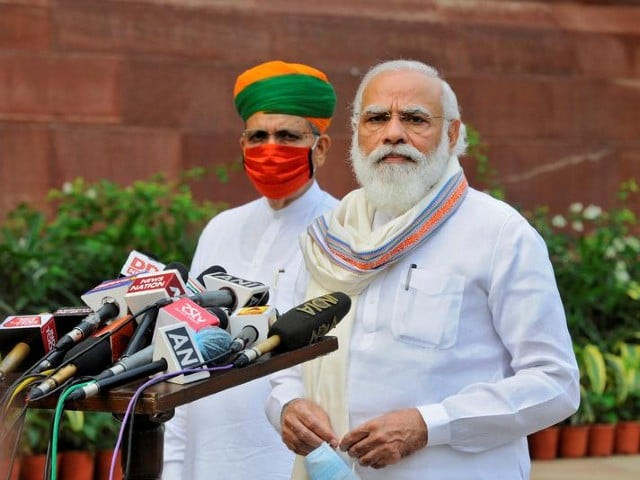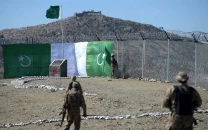Modi govt urged to revisit its ‘Chanakya doctrine’
Foreign Office spokesperson says neighbours concerned over dangerous indoctrination of Indian leadership

Pakistan on Thursday urged the current Indian leadership to abandon ‘3rd century BCE doctrine’ and learn from the post-World War II history, saying dangerous indoctrination of the Indian leadership was cause of concern for all of India’s immediate neighbours.
Speaking at a weekly news briefing, the Foreign Office Spokesperson Zahid Hafeez Chaudhri said that it was time for Indian Prime Minister Narendra Modi and his associates to do “some serious introspection.”
“In the interest of regional peace and security, the current Indian leadership will be well advised to abandon the 3rd Century BCE doctrine and instead learn from the post-World War II political history of the world where immediate neighbours have contributed immensely to the socio-economic development and security of each other,” he said, while reacting to the recent verdict in Babari Masjid demolition case.
On Wednesday, a local court after 28 years acquitted all the accused, including former Indian deputy Prime Minister L K Advani, and concluded that Babari Masjid demolition was not pre-planned.
The judgment triggered a strong reaction from Pakistan and the Muslims in India, who condemned the ruling as grave injustice. The court had overlooked 850 witnesses and other compelling evidence while delivering the verdict, giving credence to the general belief that BJP-RSS inspired people have now taken over every Indian institution, including the judiciary.
“Yesterday’s flawed decision by the Special CBI court in India in the Babri Masjid demolition case is yet another manifestation of permeation of extremist ‘Hindutva’ ideology in all state institutions of India,” the spokesperson regretted.
If there was a semblance of justice in the so-called largest democracy, the individuals, who had boasted of the criminal act publicly, could not have been set free, he said, adding that the decision had once again revealed the true face of India and its state institutions to the world.
“The pliant judiciary’s decision is a sad reminder of the fact that under the fascist BJP-RSS regime, extremist ‘Hindutva’ ideology takes precedence over all principles of justice and international norms,” he remarked.
About India’s “neighbourhood first policy”, the spokesperson said it was sad reality that the so-called policy was only a facade. “The current Indian leadership is in fact guided by the Chanakya doctrine – a doctrine deeply imbedded in the rank and file of the BJP-RSS combine,” he said.
“According to the Chanakya doctrine your immediate neighbour is your natural enemy as he covets your territory and resources and is positioned to take them if he is more powerful than you,” he added. “This dangerous indoctrination of the Indian leadership is concerning for all of India’s immediate neighbours,” he warned.
As part of Pakistan’s efforts to keep the UN Security Council (UNSC) and the secretary general fully apprised of the grave situation in IIOJK as well as peace and security in the region, the spokesperson said Foreign Minister Shah Mehmood Qureshi had addressed another letter to the UNSC president.
In his letter, the foreign minister highlighted the gross and systematic violations of human rights in IIOJK, India’s illegal measures to change the demographic structure of the occupied territory, and the threat to peace and security posed by India’s belligerent rhetoric and actions.
Chaudhri said that the recent crackdown against Amnesty International by the Indian government was another manifestation of its extremist agenda and inability to hear the truth from independent human rights organisations.
“The BJP regime’s action has once again revealed the true face of India to the world,” he said. “Today, the so-called largest democracy in the world stands fully exposed,” he noted.
Chaudhri said that Pakistan’s offer for a meeting of convicted Indian spy Commander Kulbhushan Jadhav with his father and wife remained valid. “However, we have not received any response from the Indian side yet.”
“As for our position on Indian incongruous demand of allowing Indian or a foreign lawyer to represent Commander Jadhav [in the Pakistani court],” he said, India had been told repeatedly that only those lawyers could represent Jadhav, who had the licence to practice law in Pakistan.
“This is in accordance with legal practice in other jurisdictions as well, he said. “The Indian Supreme Court, in one of its judgments, also ruled that foreign lawyers cannot practice law within the country,” he pointed out.



















COMMENTS
Comments are moderated and generally will be posted if they are on-topic and not abusive.
For more information, please see our Comments FAQ